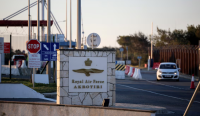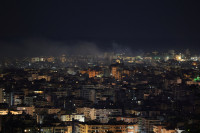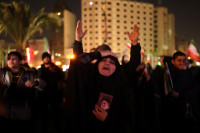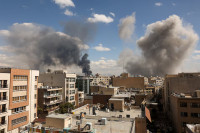World
Conflict in Middle East shadows oil industry gathering in Malaysia
Israel launched strikes on Friday against Iran, including on its nuclear power facilities, that it said aimed to prevent Tehran from building an atomic weapon.
Reuters
Global energy executives gathered in the Malaysian capital on Monday for an industry conference with an eye on the dramatic escalation in the conflict between Israel and Iran, which has fuelled worries that it could widen and disrupt supply.
The head of Saudi state oil giant Aramco (2222.SE) said conflict underscores the importance of oil and gas.
“(History has) shown us that when conflicts occur, the importance of oil and gas can't be understated,” Chief Executive Amin Nasser told delegates by videolink.
“We are witnessing this in real time, with threats to energy security continuing to cause global concern,” he said, without directly mentioning the fighting between Israel and Iran.
Israel launched strikes on Friday against Iran, including on its nuclear power facilities, that it said aimed to prevent Tehran from building an atomic weapon.
The fighting intensified over the weekend, with Israel targeting an installation at Iran’s South Pars gas field on Saturday, the first attack on Tehran’s oil and gas sector, which partially shut production.
The attack on South Pars was surprising given its importance as a production facility, said Takayuki Ueda, chief executive of Japanese oil and gas explorer Inpex Corp (1605.T).
“The market feels the situation is still under control by both countries, and I hope this situation will not be escalated,” he told Reuters, adding that the firm’s operations in the United Arab Emirates were running smoothly.
“If this is a really, really a full-fledged war, I think oil price will be hiked to more than $100,” Ueda said.
Oil prices dipped on Monday after rising earlier in the session and surging 7 percent on Friday.
OPEC secretary general Haitham Al Ghais, who spoke at the event, did not take questions about the conflict and its impact on oil markets from a Reuters reporter.
Numerous other executives attending the event also declined to comment on the events in the Middle East.
Energy services firm Baker Hughes said it continued to operate its facilities in the region.
“It’s a little early, and we’ve got to monitor the situation with regard to what’s the potential impact on supply,” Chief Executive Lorenzo Simonelli told Reuters on the sidelines, adding that the firm's employees were safe.




 9.7°C Kathmandu
9.7°C Kathmandu














